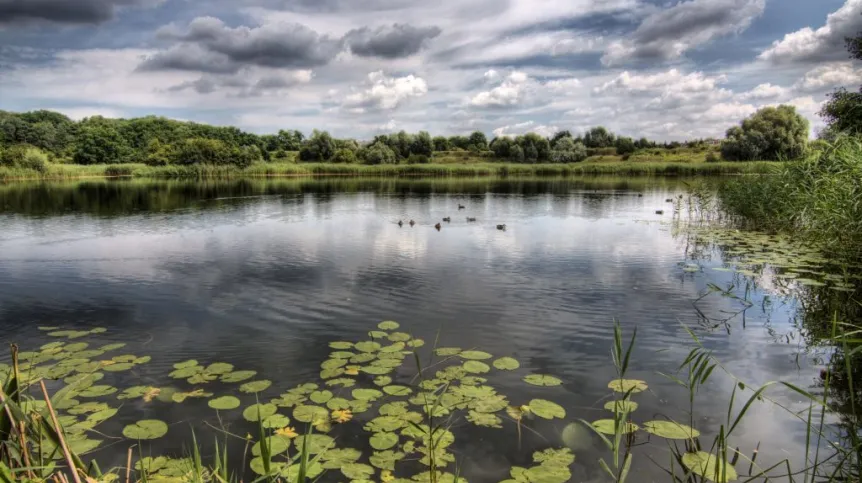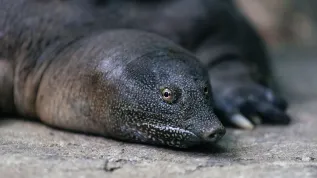
Freshwater mussels are a group of animals with an ecological role comparable to bees and equally threatened - said dr. Tadeusz Zając from the Institute of Nature Conservation PAS, one of the authors of a report on the situation and protection of mussels in the waters of Europe. The report appeared in the journal "Biological Review".
In developed countries worldwide the populations of freshwater mussels dramatically decline, and several important species are threatened with extinction. That is why scientists from 26 European countries examined the status of 16 species of freshwater mussels in Europe and published the first comprehensive report on the matter. Data for Poland have been prepared by Dr. Katarzyna Zając and Dr. Tadeusz Zając from the Institute of Nature Conservation PAS in Kraków.
The report shows that the situation of freshwater mussels in Europe is not good, and that it reflects the state of freshwater reservoirs and rivers.
The situation of mussels is affected mainly by river regulation: straightening and fencing channels, causing hydrological destabilization of the channel and the loss of fish (their presence is necessary at one stage of the development cycle of mussels).
Mussels also die because of pollution and excessive fertilization of water (due to fertilizer leaching from farmlands). In the past, the numbers of mussels decreased as a result of the mass harvesting of their shells for industry, clothing and jewellery, and catching them for pearls and mother of pearl. Today these materials are obtained mainly from cultures.
The most important new risks include invasive alien species, which compete with native species. Also unfavourable are obtaining water and aggregates and climate change.
In Poland and throughout the region, the species diversity of mussels is lower than in southern Europe. We do, however, have a lot of species that are rare in the West - said Dr. Katarzyna Zając. An example of a large freshwater mussel, described in the report, is thick shelled river mussel. For this species special areas are set, covered by protection plans in the Natura 2000 network.
We lost while the flagship species of large mussels, which was once used to harvest pearls - freshwater pearl mussel, still found in France and Germany. "The last positions were in the Sudetes, however, we failed to confirm their presence. In 2007 we only found shells washed by the river from sediments; there were no live mussels" - said Dr. Katarzyna Zając.
We still have - mainly in lakes - many positions of common species. Mussels also return to the rivers where water quality is improving - noted the specialist. "This is due to the implementation of long-term policy and large-scale infrastructure investments. Treatment plants are built, and the areas in many communes are channelled. Big polluters in the industry are also under scrutiny. It was a very important source of pollution, which led to deterioration of water in many places. Today the situation is much better in this respect" - she said.
A relatively new threat to native mussels are invasive species that take over some positions. Animals accidentally introduced into our fauna include, for example, zebra mussels, corbicula fluminea, C. fluminalis and the Chinese pond mussel.
We are losing many positions of mussels, because we still know them quite poorly - added Dr. Katarzyna Zając. "Former positions of thick shelled river mussel are not confirmed anymore. We discover new ones, often in hard to reach areas. The balance appears to remain the same, but in fact the number of positions in Poland is dropping" - she emphasised.
The authors of the report in the "Biological Review" propose how to better protect mussels. First of all, we should pay attention to them, because where they disappear, the quality of the aquatic ecosystem certainly leaves much to be desired. The lack mussels leads to impaired functioning of aquatic ecosystems, so their occurrence should be restored in all streams and reservoirs, in which the environment allows it - explained Tadeusz Zając.
We must also take care of the welfare of these animals in their natural habitats, in order to maintain species richness and variety of functions. In Europe, there are programs for the protection and propagation of endangered mussels. Their total value is over 64 million euros.
Experts point out that although molluscs are the second richest in species group of animals after insects, they are still insufficiently studied. "New species are discovered even in Europe. Freshwater mussels are little-known organisms, mainly because of their secretive lifestyle. Showing them to laymen usually provokes the question: are they edible?" - said Dr. Tadeusz Zając.
Meanwhile - he added - in well preserved river and lake ecosystems, bottom and banks are covered by hundreds of thousands of large mussels, each of which is able to filter tens of litres of water a day deactivating biological contaminants, trapping suspension and the elements they need, eventually building them into the substrate. Freshwater mussels provide these ecosystem services on a massive scale - in natural aquatic ecosystems they may be distributed so densely that their numbers are only limited by space. Their biomass may constitute up to 90 percent of mass of all benthic organisms. Therefore, their disappearance leads to serious consequences for water quality.
Large species of freshwater mussels are long-lived, they can live for over 200 years - said Dr. Tadeusz Zając. "So if they are found somewhere - we know that we are dealing with a stable ecosystem - he noted. - As the hard shell hides a sensitive mollusc body, through which the surrounding water flows, mussels react quickly to any changes in physical, chemical and biological properties of water, which has been used in numerous biological monitoring systems, including water treatment plants".
Mussels have a very complicated way of reproduction: larger species produce a sort of spider webs stretched in the water, in which they keep their offspring in the form of microscopic larvae. The larvae attach themselves to the fish "caught" in such a network, and travel with fish to new areas. They live for a few weeks attached to fish before they transform into a mussel. Without certain species of fish mussels do not reproduce, which means that their presence also reflects the structure of fish stocks. Because the waters of rivers and lakes come from large catchment areas, the presence of mussels also reflects the quality of the environment outside the water environment - explained the expert from the Institute of Nature Conservation PAS.
The report is available here.
PAP - Science and Scholarship in Poland, Anna Ślązak
zan/ agt/ mrt/
tr. RL













